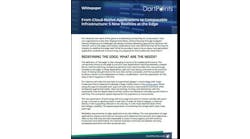With an Oct. 31 deadline looming, uncertainty surrounds the outcome of the UK Brexit plan. Data center companies in London and other UK markets are doing contingency planning for a potential “no deal” departure from the European Union, which could impact everything from the price of energy to the timely delivery of generators and other heavy equipment.
What’s clear is that the runup to Brexit has been a period of surprisingly strong investment in digital infrastructure in both the UK and EU, as data center users have moved to diversify their geographic footprints, with lots of new deployments by hyperscale customers.
Brexit concerns have factored into a surge of investment in subsea telecommunications cables, including several that directly connect Ireland to Europe, bypassing the UK.
To assess the potential impact, Data Center Frontier spoke with industry leaders in the UK, Ireland and the Netherlands, who offered insights on preparations and the overall trends surrounding Brexit. With less than a week to go before the deadline, the course of Brexit remains unclear (see the BBC for the latest news). A deal with the EU, an exit with no deal, an extension, and a new UK election are all possibilities.
“The political developments have been so frenetic that it’s been difficult to keep up,” said Emma Fryer, the Associate Director for Data Centres at TechUK, the trade association for the UK technology industry. “There are still a number of scenarios possible. Preparing for one scenario is possible. Preparing for three scenarios is another matter.”
That’s a particular challenge for smaller tech companies, according to Garry Connolly, President and Founder of Host in Ireland, which supports the Irish data center industry.
“The big global corporations have lawyers and global compliance experts,” said Connolly. “Startups often don’t have that.”
“It’s become a day to day issue, with everyone awaiting a response,” said Stijn Grove, Managing Director of the Dutch Data Center Association. “There’s still many questions to be resolved. It’s so difficult to see what’s going to happen, because there are so many possibilities
“I think most companies in this industry want a stable environment,” Grove added. “Most companies are delaying investment if they can do it.”
Data Center Growth Continues in FLAPs, Dublin
In the three years since the passage of the Brexit referendum, the European data center industry has seen robust growth. In 2018, the European FLAP markets (Frankfurt, London, Amsterdam and Paris) saw record leasing of 194 megawatts (MWs), according to a CBRE report, surpassing the previous mark of 155 MWs in 2016.
The Dublin market has seen annual growth of 140 to 150 MWs for each of the last three years, according to Connolly, with hyperscale customers accounting for much of the activity.
The Brexit vote raised concerns about future growth in London, home to one of the world’s largest data center clusters. “With the uncertainty that surrounds Brexit, we might have expected a defection of customers from the UK,” said Connolly. “The reality is that companies are just doubling down in both jurisdictions.”
“I was surprised to see the very consistent growth in London,” said Fryer. “Uptake has been quite high. Quite often its simply European firms taking space in existing colocation centers. It’s been a two-way street, as we have seen a lot of rapid expansion across Europe. We’re seeing a lot of hedging bets.”
“Brexit has impacted the industry in a positive way, in both the UK and on the continent,” said Grove. “Companies want to provision space in both places. A lot of the companies that were not in Europe chose to set up data centers here, taking space on the continent in Amsterdam or Frankfurt or Paris. Companies that were only in Europe are adding space in the UK.”
Grove said Amsterdam “continues to be a healthy growth market, the same as Frankfurt and London.” In July, two municipalities within the Amsterdam Metropolitan Area (AMA) announced a pause in issuing new permits for new data center projects in their regions. Grove said the Dutch Data Center Association has been working with local officials and expects the moratorium will be temporary.
“There is a temporary moratorium in the metro region,” said Grove. “They want to have more grid (power), and want a little more say about where the data centers go. It looks like we’re seeing resolutions by the end of this year.
“There are many new sites which are unaffected, so existing companies continue to expand,” Grove added (in fact Cyxtera opened an Amsterdam data center earlier this month).
There has been some slowing of leasing in London in the first half of 2019, which could be attributed to a global pause in hyperscale development, but also likely reflects caution ahead of the Brexit deadline.
“I think there’s a lot of ‘planning blight,'” said Fryer. “We’re seeing decisions held up.”
Subsea Cable Routes Diversify
Since the Brexit vote, there have been four subsea cables announced that bypass the UK in favor of other European countries. Several of these will directly connect Ireland’s data center cluster to other landing stations for subsea cables, including the Havfrue cable to NJFX in New Jersey, the WINS (Western Ireland- Northern Spain) cable from Galway to Bilbao, and the IFSC (Ireland-France Subsea Cable).
“We’ve seen an incredible amount of off-island fiber development,” said Connolly. “We’ve seen a massive increase in the amount of telecom cables. The plan is to circumvent the UK in case there are future concerns.”
The MAREA subsea cable emerges from the Atlantic at Virginia Beach, Virginia. (Photo: Microsoft)
Some of the new cable projects predate Brexit in their planning, while some other cables cross the UK en route to other European hyperscale markets. But the route diversity reflects changes in the world of subsea cables, which is now being driven by the needs of the largest Internet companies. The “big four” hyperscale players – Google, Facebook, Microsoft and Amazon – have become the largest investors in new subsea cable routes. Seeking to control their data and networks, these companies are rerouting undersea lanes to bring data traffic ashore near their giant data center campuses.
That’s good news for the Dublin market, where 75 percent of the demand is driven by hyperscale players. Microsoft, Amazon and Google all have large data center campuses near Dublin, while Facebook is building a campus in Clonee.
“Data centers are very much front and center in Ireland’s growth story,” said Connolly. “The metro Dublin area continues to see the most growth, and it’s primarily hyperscale demand. Dublin and Northern Virginia are very similar. Data centers want proximity to one another, and the off-island fiber.”
Brexit Contingency Planning
As the Brexit deadline approaches, TechUK is referring members to resource guides and webinars addressing specific services and industries. The British government has also published a contingency planning document (Operation Yellowhammer) addressing worst-case planning assumptions.
Data Sharing
A no-deal Brexit would also mean that the UK departs the EU’s common data protection framework, and will be subject to different rules for compliance with the EU’s GDPR privacy regulations. Companies transferring personal data to the UK from the EU must ensure adequate safeguards are in place to protect user data. If there is no national agreement, this “adequacy” standard could be managed with contracts at the corporate level.
“Data flow is one of the most critical things,” said Fryer, who said she expects the UK will prioritize data GDPR adequacy.
Host in Ireland’s Connolly agreed. “There’s broad agreement that (GDPR adequacy) will want to be retained,” he said. “It would be lunacy to meddle with that.”
“There’s broad agreement that (GDPR adequacy) will want to be retained. It would be lunacy to meddle with that.”
Garry Connolly, Host in Ireland
Energy
There are concerns that a no-deal Brexit could complicate the UK’s imports of oil, gas and electricity. In 2017 the UK’s electricity supply was 358 TWh, with 339 TWh generated domestically and 18.2 TWh of imported power. Fryer says the UK supply of energy is not expected to be interrupted by a no-deal Brexit, but “I do anticipate that energy costs could rise due to the way we purchase our energy supply.”
Equipment
Shipping and trade are among the areas that could be complicated by a no-deal Brexit. That’s a particular concern for data centers, which rely upon large generators, UPS units and chillers. “What my members are worried about is the large equipment they need to bring into the country,” said Fryer. “All of the suppliers are saying they’ll be good, but they won’t put that in writing.”
Staffing
One in five employees of data center operators in the UK are originally from EU countries, according to TechUK. “The data center sector faces an acute technical skills shortage when the EU skills pipeline is shut off in 2019, which presents operational and business risks,” the group said in a briefing document.
Stockpiling
Fears of disruptions from a no-deal Brexit have prompted stockpiling of goods that might be impacted by trade interruptions. “In the UK, a lot of companies are stockpiling,” said Fryer. “If people are overprovisioning, that will be something to look out for.”
What Happens Now?
With all the uncertainties, Fryer said the tech industry has made its best case for how Brexit might impact its interests.
“We succeeded in getting technology further up the agenda,” she said. “Many UK politicians don’t fully understand digital services, which is one of our largest exports. Our policy team has done a great job at getting issues in front of ministers. But some politicians are very keen to have Brexit, and not so keen on the terms.”
“There’s an awful lot of brinksmanship,” said Connolly. “You tend to find that common sense prevails. It’s in nobody’s interest to have the UK not be involved in our trading alliances, including digital trading. Britain cannot become an isolated island.”






